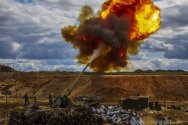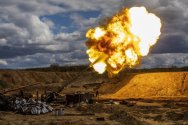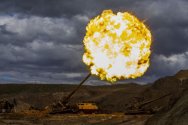Here are
the facts on
the Ukraine - to stop the fighting.
The article in "the Netherlands" is correct because it is
historical. It is the legacy of times when it distinguished the Dutch Republic from Habsburg Netherlands.
Russians don't say "the Ukraine" unless they speak English at which point they repeat incorrect usage that has been popularized.
Slavic languages don't have articles. The controversial difference is in the preposition of location - specifically between "
v" (in) and "
na" (on). Ukrainians insist on "v" which is correct in
modern Ukrainian but
not correct in any other language where it follows historical evolution of language.
Poles and Russians say "na" because the concept of "Ukraine" in those languages evolved from old Polish and Ruthenian. That's because at the time there was no country as in "state" called Ukraine. It was was a country as in "land". In Slavic you are "on" a land but "in" a country.
At the time the states were Ruthenian principalites, most notably Kiyvan Rus' (Ruthenia) which was the most important among them, followed by Republic of Novogorod. "Russia" didn't exist and Principality of Muscovy was irrelevant.
The Mongol invasion spared Muscovy as a vassal while all the other more significant Ruthenian states were destroyed. Once the Mongols withdrew the political void was filled by Grand Duke of Lithuania which ten led to the creation of Grand Duchy of Lithuania which had a Lithuanian monarch but was primarily
a Ruthenian state with Ruthenian language, culture and law. That Ruthenian state entered into a personal union with the Kingdom of Poland.
Back then "Poland" and "Lithuania" were
not names of countries. They were names of the
states which were
monarchies. There was no Poland (Polonia) only Kingdom of Poland (Regnum Poloniae) ruled by a King of Poland (Rex Poloniae) and consisting of several historical countries (now called regions): Mazowsze, Małopolska, Wielkopolska, Śląsk itd. Kingdom of Poland was known not as "Poland" but "Korona" (the Crown) as they were king's lands which were united from smaller principalities less than a century before the union. Where "Polonia" existed as a country was in writings of foreign scholars from western Europe.
In 1569 the Kingdom of Poland and Grand Duchy of Lithuania established a formal union state called Republic of Both Nations - in Polish:
Rzeczpospolita Obojga Narodow. It was commonly referred as "the Republic". It was the "UK" with Poland and Lithuania being England and Scotland. And as such people "in" Rzeczpospolita would be "on Lithuania" and "on" many regions of Poland which was still known as "the Crown". Also the two legal languages were Polish and Ruthenian - not Lithuanian.
It's important to note that this happens as Ivan IV proclaims his "Tsardom" following fall of Constantinople in 1543. There is no "Russia" yet. The "Russians" are called "Moskvicini" and Ruthenians are called "Rusyni". Ivan IV wants to use his title to conquer all Ruthenians so he gives himself the title in advance.
A century later as a result of internal fight for power in the Republic (Polish-Lithuanian Commonwealth) in 1658 another union was proposed which would transform part of the Republic into "Great Duchy of
Ruthenia" (not "Ukraine") and the Republic of Both Nations into one of Three Nations.
View attachment 88272
On the map the easternmost parts of "Poland" are ethnically Ruthenian as well. There were no "Ukrainians" only Ruthenians. Cossacks were not a nationality but a political movement.
The Russian Tsardom which based its claim to power on Ruthenian political identity treated this as existential threat, made a great effort to prevent it and succeeded.
"Russia" is best understood as Slavic America .
Russia begins as an imperial off-shoot of a single city-state (Muscovy) without its own culture or identity and with social cohesion built on military power and expansionism .
There is no
notion of "Russian nation" until the nationalist era - the very late 19th century. It never really works out for obvious reasons.
"Russia" is popular the name of an empire. There was no "Russia" only "Tsardom of Russia". It is the "Ming" or "Qing" and
not "Zhongguo".
Russia literally means "Ruthenia" in the Muscovite dialect. Being "Russian" is like being Roman or British or American. In reality only since 1991 Russians can be
Russians but even that is fragile further into Asia.
In its political ideology Russia is quite explicitly the "Third Rome" but the underlying cultural and ethnic identity is and always have been
Ruthenian. And cultural "Ruthenia" is better preserved in Ukraine than in Russia, down to the location of historically most important Ruthenian city which is Kiyv. Moscov is to Kiyv as Washington is to Boston or New York. At best Muscovy is like Macedonia to the rest of the Greeks. Or it is like America taking over Britain.
This is the irony of the Soviet anthem were in "Союз нерушимый республик свободных Сплотила навеки
Великая Русь" the "Great Russia" referred to is the
Tsarist imperial project.
The politicization of "in" and "on" in Ukrainian politics comes from Moscow's attempt to subjugate Ukrainian identity that began as soon as Russia took over Ukraine following the Partition of Poland. That identity began to develop in response to earlier Polish rule and resulted in the failed union of 1658.
The emergence of Russian national identity occurs in parallel to the emergence of Ukrainian identity which occurred
within the Austrian Empire following the Partition of Poland.
Political Ukraine is a German invention and it occurred because Russia already existed and would deny and contest "Ruthenia" as an existential threat - just as it did before. German for "Ruthenians" is
die Reußen while for "Russians" it's
die Russen.
It was part of two empires fighting for control over subjugated territory that they split.
And this is where we get to "the Ukraine".
"The Ukraine" is an incorrect translation of the German phrase "die Ukraine" which refers to a cultural region in the Austrian Empire. In German there are other such places e.g. "die Schweiz" (Switzerland) or "die Slowakei" or "die Türkei" which are the result of
evolution of German language in its political setting.
Here's how German language works - countries which are proper nouns do not use articles. When you say "
We are in Poland" it is "...
in Polen". Same with Russia - "
in Russland". But when you say "we go to Ukraine" it is "
...in die Ukraine" and "we are in Ukraine" is "
...in der Ukraine". Much like when you refer to Switzerland - there's always that definite article sticking around. And that definite article has been translated from German sources into English and adopted into common use. Incorrectly - because there's no direct reference to "Ukraine" in English.
How do we know it's incorrect? Let's ask the other pre-eminent power of the time for opinion. How do the French go in "the Ukraine"? Les Francais vont
en Ukraine, without the
l'.
Similarly the Italians refer to Ukraine without the definite article despite having them in their language. Why? Because the French and Italians had direct exposure to Ukraine through cultural links with Poland and Austria. There were French and Italian people living there, as were the Germans. The languages reflect that to the French and Italians it was a "country" and to the Germans (Austrians) it was a "land" in their empire. And what's more important it was
their Ukraine - die Ukraine - not the
Russian one.
----------------
This is not a pro-Ukrainian or an anti-Russian post but a pro-fact and anti-propaganda post.
In any case I give this thread a week maximum. I bet my usual three cents that it will crash and burn on the 9th.




